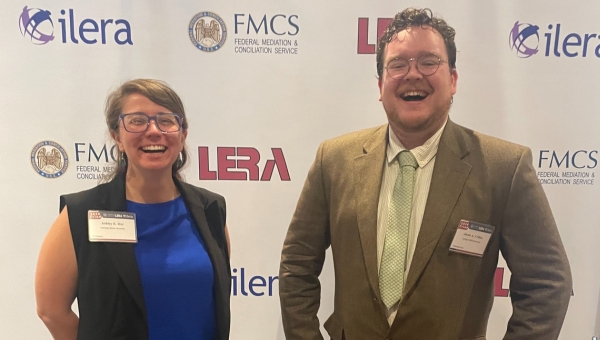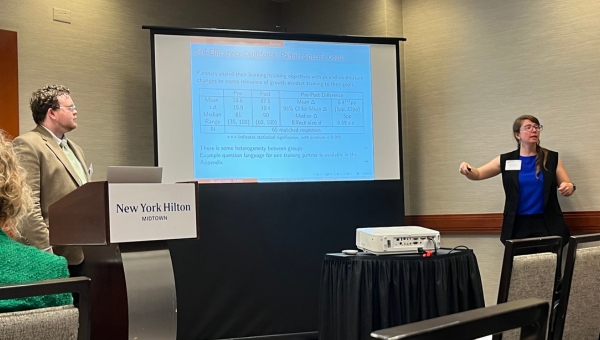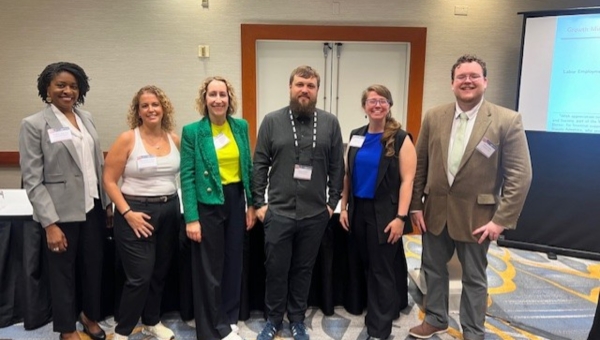Mindset Matters: Employing Economic Research and Practical Interventions to Fight Poverty
By Jennifer Monahan
Those are the questions that interest Ashley Orr, a Ph.D. candidate at Carnegie Mellon University’s Heinz College of Information Systems and Public Policy. She describes the work of putting research into action to combat poverty as being an “anti-poverty practitioner,” and she’s passionate about it.
It’s unjust that there is as much inequality and poverty as there is in our world today. As a researcher, I do not assume the answers to my research questions. But the values a researcher has surely influence the research questions they ask.Ashley Orr
“It’s unjust that there is as much inequality and poverty as there is in our world today,” Orr said. “As a researcher, I do not assume the answers to my research questions. But the values a researcher has surely influence the research questions they ask.”
Orr’s values have been shaped by her experience growing up in a low-income, single-parent household. She is a first-generation college student whose mother and grandmother encouraged her to pursue her education.
Today, Orr studies the barriers workers face when they’re engaging with the labor market, and how those barriers affect their economic mobility. She is putting her research to work in a practical way via collaboration with a local workforce training program.
Turning Research into Practice: The Growth Mindset Project
Orr encountered a culture of exploration and innovation when she came to Heinz College. Within that context, she decided to put her theories into practice to create more economic inclusion in the local community.
With support from her advisor, Professor Brian Kovak, and mentors Professors Lowell Taylor and Edson Severnini, Orr applied for and was awarded a sub-grant of $25,755 from the Biden administration’s Build Back Better (BBB) Regional Challenge. The grant is funding a project to implement the theories she’s learned by embedding growth mindset into programs that prepare workers for the changing labor market.
With a landscape that is evolving to include the use of generative AI in the workplace, the types of work available and the tools we use to do that work will change over time, Orr said. Millions of U.S. workers will need to engage in some kind of upskilling within the next decade. That upskilling is one way to promote equitable economic growth; it’s also where growth mindset enters the picture.
Growth mindset, based on the work of Carol Dweck and David Yeager, is the belief that human capacity is something that can be developed over time through effort, with appropriate support and strategies. Some historical surveys estimate that more than 50 percent of the population operates out of a fixed mindset, believing our skills are set and can’t be developed.
Though growth mindset is not a new concept, this initiative is the first time it’s been applied in job retraining for community partners in Southwestern PA.
“You can see how a fixed mindset could become a problem for any large economic transition which requires many workers to upskill,” Orr said.
Orr’s Growth Mindset Project aims to do two concrete things:
- Support the instructors who are retraining workers in emerging occupations to build courses that embed a growth mindset.
- Teach those who are upskilling the concept of growth mindset and give them opportunities to practice it.
The first element includes presentations, interventions, and small group collaborative work. One example of an intervention is asking instructors to think about how to respond to a student who seems to be shutting down when engaging with new technology.
The second element asks job trainees—those making career transitions—to analyze their own mindset. Participants learn about growth mindset and are asked how they might support their peers and colleagues in practicing a growth mindset to learn new skills.
Breaking Down Barriers: What Policymakers Need to Know
One important aspect of implementing growth mindset practices in a job training setting is to make sure sufficient support is in place for student and trainee success.
“Meeting students where they are, supporting them with caregiving help or transportation—the broad menu of things that someone might need to be successful—is important,” Orr said.
That insight goes back to Orr’s research on structural barriers. One consideration for policymakers is that funding must be allocated properly, to solve the challenges that directly affect a participant’s ability to succeed in job retraining programs.
For example, a new mom needs reliable childcare to be able to attend a job training class. Lacking that care is a barrier that might prevent her from attending classes or completing training.
Another consideration for the pilot program is to remove the stigma and shame sometimes associated with asking for help.
Using support doesn't make a learner, a student, or a worker any less capable or worthy than any other person. Using support is actually a really good strategy to be successful.Ashley Orr
“Using support doesn't make a learner, a student, or a worker any less capable or worthy than any other person,” Orr said. “Using support is actually a really good strategy to be successful.”
She also considers factors like time and cognitive load.
“Many of our public policies are quite conditional,” Orr said. “We ask folks to apply and reapply and affirm their qualification, and that creates work in order to remain eligible for those programs.”
Effective policy shaping social programs should make people’s lives easier, not harder.
To address that issue of feeling “less than,” the Growth Mindset Project pilot asks participants to think not only about their own mindset, but how they can support their colleagues and peers in developing a growth mindset.
“Folks who, like myself, grew up low-income and who maybe have used public programs to support them, might view themselves as someone who needs support in order to be successful,” Orr said. “There's research to show that seeing yourself as a giver of support is deeply empowering.”
A growth mindset culture in the workplace and in classrooms comes from all members of the group helping each other and being responsible to form that culture. That’s the environment that Orr has attempted to foster with this project.
The Intersection of Lived Experience and Education
Orr’s childhood goal was to graduate from college. With encouragement from her mother and grandmother - and an appetite for math - she hoped to become a high school math teacher. But in college, Orr took an economics course and had a eureka-moment.
“I realized, Oh! These are the frameworks by which we can understand poverty, the frameworks by which we can understand the persistence of inequality,” Orr said.
Policy is inherently intertwined with economics, Orr said, because how society designs policies directly affects workers’ well-being.
“The nuance here is that blind pursuit of economic growth does not acknowledge how that growth is distributed,” Orr explained. “We have to think critically about equity within that economic growth.”
A Meeting of the Minds
To assist in implementing the Growth Mindset Project, Orr enlisted Jacob Cribbs, a master’s student in Heinz College’s Public Policy and Management program, to collaborate. Like Orr, his interest in the project is personal as well as academic and professional.
“I grew up in a community that suffered pretty harshly under the recession,” Cribbs explained. He was interested in labor policy from an early age, studied policy at Indiana University, Bloomington, and worked at United Way of Central Indiana before coming to Carnegie Mellon.
As a student in Orr’s Quantitative Skills Summer Program (QSSP) math course, Cribbs learned first-hand how an instructor who embeds growth mindset into the classroom can foster student learning in traditionally challenging subjects. When the position opened to assist Orr with the implementation and research needed for the BBB Growth Mindset Project, Cribbs applied.
Prior to graduate school, Cribbs had worked in a technology consulting firm. Seeing the way data could be used to improve business efficiency inspired him to want to put those same skills to work to help people. With the Growth Mindset Project, Cribbs said, quantitative analysis can be used for practical societal good.
We’re using research and data analysis – regression, survey analysis – to improve people’s lives, to help people grow as individuals.Jacob Cribbs
“We’re using research and data analysis – regression, survey analysis – to improve people’s lives, to help people grow as individuals,” Cribbs explained.

Ashley Orr and Jacob Cribbs at the 2024 LERA Conference in June.
Applying rigorous analysis to understand whether, how, and why their pilot program is working will ultimately help Orr and Cribbs to improve strategies for those who oversee job reskilling initiatives. Their work in this practical context directly serves current participants; they hope their findings will inform the way future programs are created and implemented for a much broader community of workers who will need to retrain for the changing economy.
The Results
Anecdotal feedback from participants and project partners has been positive, Orr said. Participants shared concrete plans to use the practices they learned and talked about how growth mindsets had improved their communication with staff and students.
Orr and Cribbs collected, analyzed, and presented their pilot project at the Labor and Employment Relations Association (LERA) conference in June. Their research suggests that the brief 75-minute Growth Mindset session they delivered influenced trainers’ mindset beliefs towards growth; trainers are now more likely to agree that skills are malleable qualities that improve with effort, support, and strategies.

Ashley Orr and Jacob Cribbs present their findings at the 2024 LERA Conference.
They also found that trainers’ self-efficacy—or confidence in the use of growth mindset training strategies—improved by 13 percentage points from pre- to post- training.
Orr and Cribbs were excited to provide resources for others interested in creating retraining and job training programs that implement growth mindset strategies.

Orr and Cribbs with fellow conference participants.
What’s Next
With the conference behind them, Cribbs is completing a summer internship at The Team PA Foundation: Early Learning Investment Commission before continuing his master’s degree coursework this fall. Orr’s long-term goal is to secure a tenure-track faculty research and teaching position.
Whatever the future holds for Orr, she plans to continue her anti-poverty work.
“Any researcher interested in research questions that address economic inequality is doing the hard work of making our economy more equitable,” Orr said. “My concern that poverty is deeply unjust means, in practice, that I will always be asking research questions that center low- and middle-income workers.”